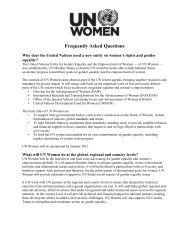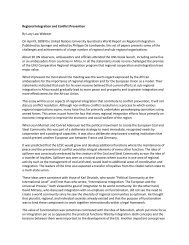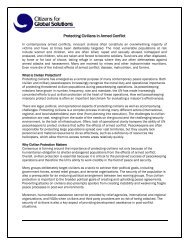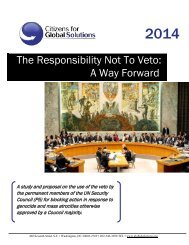Minerva, Spring 2008 (Volume 32) - Citizens for Global Solutions
Minerva, Spring 2008 (Volume 32) - Citizens for Global Solutions
Minerva, Spring 2008 (Volume 32) - Citizens for Global Solutions
You also want an ePaper? Increase the reach of your titles
YUMPU automatically turns print PDFs into web optimized ePapers that Google loves.
BOOK REVIEW<br />
<strong>Global</strong> Environmental Governance,<br />
Perspectives on the Current Debate<br />
edited by Lydia Swart & Estelle Perry<br />
Marquita K. Hill<br />
March <strong>2008</strong><br />
Marquita Hill, retired to Virginia from<br />
the University of Maine’s Department<br />
of Chemical Engineering, presented in<br />
<strong>Minerva</strong> #28 (February 2005) an overview<br />
of some of the many transboundary<br />
pollution problems that cannot be<br />
solved without international cooperation,<br />
based on the second edition of her book,<br />
Understanding Environmental Pollution,<br />
published in 2004 by Cambridge University<br />
Press. Her review of several books<br />
on biological warfare appeared in<br />
<strong>Minerva</strong> #24 (November 2002).<br />
Lydia Swart is Executive Director of<br />
the Center <strong>for</strong> UN Re<strong>for</strong>m Education and<br />
Estelle Perry is its President.<br />
<strong>Global</strong> Environmental Governance,<br />
Perspectives on the Current Debate was<br />
published by the Center <strong>for</strong> UN Re<strong>for</strong>m<br />
Education in May 2007.<br />
In the Introduction, Swart and Perry point out that global climate change is not the<br />
only “inconvenient truth”. Another is that “global environmental problems require<br />
global solutions”. However, “the institutional deficiencies of global environmental<br />
governance … hamper global ef<strong>for</strong>ts to effectively address climate change” and many<br />
other environmental issues. This book’s intent is to identify shortcomings in the United<br />
Nations system <strong>for</strong> handling environmental issues and examine recommendations to<br />
overcome them. These problems “revolve around a lack of authority, institutional capacity<br />
and resources”. “There is growing realization that unless global environmental<br />
governance is dramatically improved, the goal of providing environmental security <strong>for</strong><br />
the world’s peoples cannot be achieved.”<br />
The problem: Ninety million people are added to the world population each year and<br />
yet, already with our current population, one in three persons lacks enough fresh water;<br />
greenhouse gases continue to accumulate; ecosystems necessary to our survival continue<br />
to be degraded; and land degradation threatens food security, especially in Africa.<br />
Humans have not been able to stop this trend despite the United Nations Environment<br />
Program (UNEP). This program, founded in 1972, is weak, under-funded, and, thus,<br />
ineffective in the functions assigned to it.<br />
Possibly, we could improve this situation by strengthening UNEP. To this end, a chapter<br />
is devoted to “Moving Forward by Looking Back: Learning from UNEP’s History”.<br />
The UNEP was not purposefully established as a “weak, underfunded, overloaded, and<br />
remote organization”. There was great hope that it would “serve as the world’s ecological<br />
conscience”. It would also acquire and disperse reliable environmental in<strong>for</strong>mation,<br />
set goals and standards, and provide technical assistance as well as education & training<br />
and public in<strong>for</strong>mation. Too, it would speed up actions on urgent environmental<br />
problems.<br />
Un<strong>for</strong>tunately, UNEP is a Program. Within the UN hierarchy, a Program has the least<br />
independence and authority, and must rely on voluntary financial contributions <strong>for</strong> its<br />
operations. Moreover, environmental responsibilities are spread throughout many UN<br />
organizations. Worse, there is no database that would allow one to find which organizations<br />
are active in a specific environmental activity. This statement leads to a conclusion<br />
as to the biggest weakness of the current global environmental governance: there<br />
is a lack of coordination.<br />
Overall, there is “a disconnect between the magnitude of environmental problems on<br />
the one hand and the ability of contemporary institutions to effectively address them<br />
on the other”. Even worse, the “challenges of environmental governance are huge and<br />
still growing”.<br />
Despite this pessimistic assessment, there is progress, sometimes amazing. Advanced<br />
industrialized countries now spend 2–3% of their GNP on the environment. Some of<br />
the many treaties enacted through UNEP have been effective. The best known, in terms<br />
of its effectiveness, is the reduction of stratospheric ozone reduction. Others are re-<br />
45 • <strong>Minerva</strong> #<strong>32</strong> • June <strong>2008</strong>













